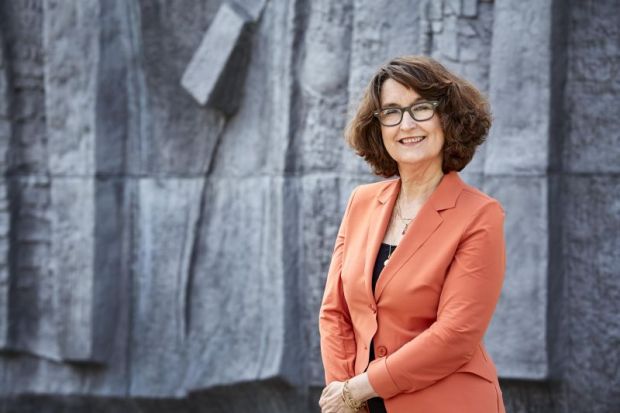When Simone Buitendijk accepted the job of vice-chancellor at the University of Leeds, she had no inkling of the crisis that was about to hit the world and the global higher education sector.
“I interviewed before Covid, just before the crisis hit. I signed my contract when we didn’t know that it was coming,” she said, before quickly adding: “I would have signed it anyway.”
Starting a job as a new university leader is always a daunting task, but it is especially so at a time when teaching and research has been disrupted and even meeting colleagues and students is a challenge.
But Professor Buitendijk, who took over the top job at Leeds on 1 September after four years as vice-provost (education) at Imperial College London, said it was “important in any time of crisis that leaders don’t just look at the crisis right in front of them”.
“I want to think about how the University of Leeds can come out of the Covid crisis not just intact but actually better than we went in, and that means prioritising the things that I would have been doing anyway but are even more important now because of the Covid crisis,” she said.
Professor Buitendijk, who was vice-rector at Leiden University before her role at Imperial, is a champion of diversity in academia and teaching innovation. She co-authored the League of European Research Universities’ reports Women, Research and Universities: Excellence without gender bias (2012) and Equality, Diversity and Inclusion at Universities: The power of a systemic approach (2019), and has written extensively about the need for universities to embrace technology in their teaching.
Perhaps, then, it is no surprise that at Leeds she plans to abolish the traditional lecture and take a systemic approach to tackling equality and diversity.
She said most universities were “looking at their online provision very much still in the emergency mode”, but institutions needed to ensure that “we match our pedagogy to the hybrid and online model much better than we are now doing”.
“The 45-minute lecture – it’s so outdated, its pedagogically not sound, it’s not evidence-based…And if you put that kind of delivery online, it’s even worse than when you do it in a lecture theatre. For me, that would be the worst of both worlds – to put 45-minute lectures online and say, ‘Here’s your university education,’” she said.
“So lectures will go at the University of Leeds, but they’ll be replaced with lecturing in shorter chunks, some of which will be watched by students before they come to the classroom, so while they’re together they can actually use the knowledge, the facts, the materials and become more creative and engaged with their teaching.”
On equality and diversity, Professor Buitendijk said it was vital to not leave this work to individuals, and “especially not to the under-represented minorities or the people who are in a worse position to begin with”.
“It’s not their responsibility to fix the problem. If they want to work with the leadership, that’s great; but it’s first and foremost an issue that the university leadership needs to embrace and talk about,” she said, adding that this work had to go much further than “removing a few bad apples from the community” or implementing “one single project”.
A systemic approach means reviewing “the curriculum that you teach, the way you engage with students in a more interactive classroom…the kind of research we’re doing, how we engage with the community around our university, what we reward and what we value, [and] how we admit students”, she said.
“All of these things need to start with a deep understanding of issues of inequality and where they come from. And how also to make the privileged majority understand it’s something we can all gain from. It’s not just a matter of fairness, it really is about an engaged, happy community and academic quality.”
Other key priorities for Professor Buitendijk include focusing on the United Nations’ Sustainable Development Goals, strengthening Leeds’ collaboration with universities in the Global South and treating students as partners, so they can contribute to ideas of how the university should operate in the future.
She also wants to encourage the university sector to carry forward the increased collaboration that has occurred during the pandemic.
“There’s still competition,” she said, referencing the race for a Covid-19 vaccine, “and I think there are still too many vested interests.”
But Professor Buitendijk said universities have far more similarities than differences and “it makes so much sense to work together”.
“It hasn’t really been that difficult to go from Leiden to Imperial and, I think, also from Imperial to Leeds. It feels like I’m right back at home again,” she said.
“I’ve even found that travelling to universities in China and on the Africa continent there is something that binds academics and universities and it’s really powerful.”
POSTSCRIPT:
Print headline: Equality and end of lectures on agenda for new Leeds v-c
Register to continue
Why register?
- Registration is free and only takes a moment
- Once registered, you can read 3 articles a month
- Sign up for our newsletter
Subscribe
Or subscribe for unlimited access to:
- Unlimited access to news, views, insights & reviews
- Digital editions
- Digital access to THE’s university and college rankings analysis
Already registered or a current subscriber? Login







